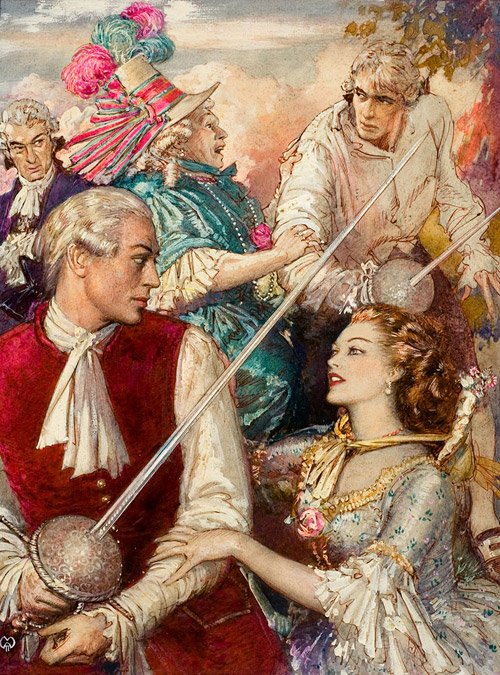 Recently a friend was talking through some boyfriend issues with me—she’s caught in a wretched limbo state of being more than a friend but less than a lover—and was trying to interpret some things he had said. An apparently innocuous comment had become, after she thought about it some more, a statement “fraught with dire import.” I said such hyperanalysis sounded like Faulkland in the Richard Sheridan play The Rivals (1775), which I had just seen with my students in a Baltimore Center Stage production.
Recently a friend was talking through some boyfriend issues with me—she’s caught in a wretched limbo state of being more than a friend but less than a lover—and was trying to interpret some things he had said. An apparently innocuous comment had become, after she thought about it some more, a statement “fraught with dire import.” I said such hyperanalysis sounded like Faulkland in the Richard Sheridan play The Rivals (1775), which I had just seen with my students in a Baltimore Center Stage production.
Sheridan uses Faulkland, the protagonist’s best friend, to satirize the cult of sensibility that in the mid-18th century was attracting normally stiff-upper-lip Brits. (Jean Jacques Rousseau had given them permission to talk about their emotions.) Faulkland has a secure relationship with Julia but, because he is ultrasensitive, he can’t acknowledge her love and faithfulness. Instead, he surfaces a host of doubts about which he then obsesses, finally driving her away.
For instance, he thinks she isn’t tearful enough when they are apart, he worries that she might be marrying him out of gratitude to his father rather than love, he hears nuanced reservations in her every utterance. In one comic scene, after she has stormed into an adjoining room and locked the door, he imagines the various things that must be going through her mind. Here’s his monologue:
In tears! Stay, Julia; stay but for a moment. The door is fastened! Julia! my soul! but for one moment! I hear her sobbing! ‘Sdeath! what a brute am I to use her thus! Yet stay. Ay, she is coming now. How little resolution there is in woman! How a few soft words can turn them! No, faith! she is not coming either. Why, Julia, my love, say but that you forgive me. Come but to tell me that now. This is being too resentful. Stay! she is coming too. I thought she would, no steadiness in anything: her going away must have been a mere trick. Then she sha’n’t see that I was hurt by it. I’ll affect indifference. [Hums a tune: then listens.] No zounds! she’s not coming! nor don’t intend it, I suppose. This is not steadiness, but obstinacy! Yet I deserve it. What, after so long an absence to quarrel with her tenderness! ‘Twas barbarous and unmanly! I should be ashamed to see her now. I’ll wait till her just resentment is abated; and when I distress her so again, may I lose her forever! and be linked instead to some antique virago, whose gnawing passions and long-hoarded spleen shall make me curse my folly half the day and all the night.
Nor is this the end of it—he manages to torment her a few more times with his doubts before the two are finally reconciled.
My friend knew the play and appreciated the allusion. It reminded her of the perils of reading too much into someone’s words.
That being said, she herself does not enjoy the security of Faulkland’s and Julia’s relationship, the comedy of which comes from Faulkland being blind to Julia’s devotion. Rather, she is negotiating a highly ambiguous situation. So I started thinking of the opposite problem, where someone reads too little into someone’s words. The figure that came to mind was Sparkish in William Wycherley’s Country Wife, a play that Sheridan admired.
The doltish Sparkish, who is engaged to be married to the elegant Alithea, sees one of his friends (Harcourt) courting her. Alithea is determined to be loyal to her fiancé and informs Sparkish of Harcourt’s behavior, but Sparkish chooses not to see it–chooses not to see, indeed, what it literally happening in front of his face. He believes that macho men are so confident of their ability to hold on to their women that they are never jealous and that therefore, by ignoring Harcourt’s overtures, he is proving his self confidence. To the audience’s delight, by the end of the play he has lost Alithea to his more deserving friend.
To summarize, in the heated world of relationships the sensitive soul will imagine things that are not there and the insensitive soul will overlook things that are. Literature can hone our skills of reading between the lines while at the same time reminding us to use common sense. Think of a good couples comedy as a workshop on dating.
